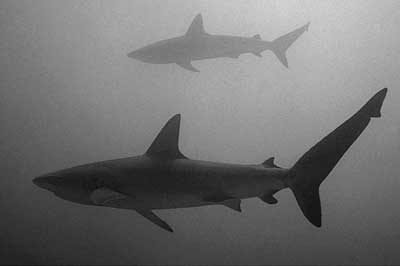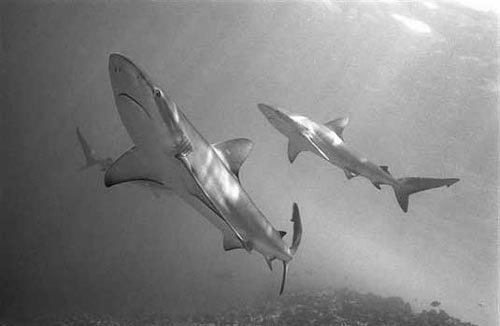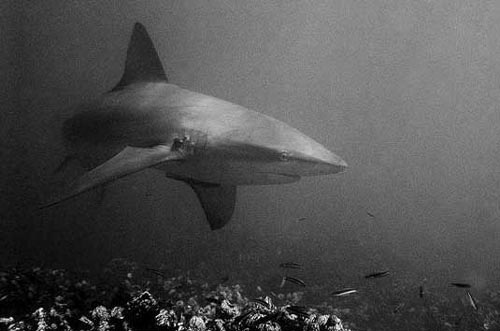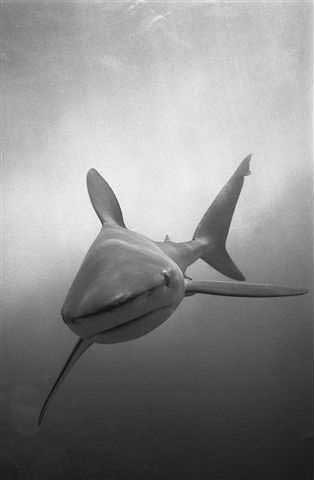Slaughter in Paradise: J' Accuse !
Article and Photos by Wolfgang Leander
Wolfgang Leander (www.oceanicdreams.com) is a naturalist with a deep and abiding passion for free-diving with and photographing sharks. He is based in Ecuador, but he really lives beneath the surface off the Galapagos Islands ... one held-breath at a time. As his achingly beautiful black-and-white images convey, Wolfgang truly and utterly loves sharks. It should not come as a surprise to discover that he — like virtually all diving naturalists — cares deeply about their continued survival in the World Ocean. Outraged by recent large-scale shark slaughter in the Galapagos, Wolfgang was compelled to write the following article. In it, he decries the wanton slaughter of sharks in the Galapagos and proposes tough, no-nonsense response from UNESCO to the government officials responsible. Read his passionate words. Feel your own reaction to the horrors he describes. Then resolve to do your part to let the Ecuadorian government know that you will not tolerate their squandering any part of the shared natural heritage of all mankind.
— R. Aidan Martin

Charles Darwin visited the Galapagos Islands as a young man on a voyage in 1835. His keen observation of the island flora and fauna found nowhere else on earth led him directly toward his theory of the evolution of species.
Not much later, Herman Melville sailed to the Galapagos as a whaler and called the volcanic archipelago "Las Encantadas", the "Enchanted Islands".
Ecuador claimed the "Encantadas" in 1832 from Spain. At that time they seemed to be of no value to any imperial power. In 1978, the UNESCO declared the Galapagos a World Heritage Site. Today, the islands are Ecuador's top tourist destination, generating over USD 150 million per year in revenues. Nature lovers consider the islands a paradise.
Yet, this paradise is in deep trouble.
There is growing concern among local and international scientists and conservationists that massive tourism, illegal immigration, pollution, over-fishing, and political meddling seriously threaten the islands.
Headlines of articles on the Galapagos typically read as follows: "Conservation on the Brink"; "World Heritage in Danger"; "Longline Fishing to be allowed in the Galapagos"; "Chaos reigns in the Galapagos National Park"; "Shark population under Threat".
"El Comercio", the leading Ecuadorian daily newspaper, published an alarmingly realistic article on shark finning in the Galapagos on March 15, 2005, under the heading: "The massacre of Sharks in the Galapagos continues at an accelerated rate".
'Finning' is a brutal way to slice off the fins of sharks, often from live animals, then dumping the helpless creatures back into the ocean to face an agonizing death.
Current finning is a relapse into bad practice that was already outlawed. Shark fishing and the export of shark fins was banned in September 2004 after a long battle between militant local fishermen and the government, which had to give in to massive pressure from international conservationist organizations.
However, the illegal practice of shark finning carried out with the tacit approval of the Ecuadorian Navy and local law enforcement officers never diminished.
The "International Galapagos Tour Operators Association" (IGTOA) fears the worst. In their January 2005 bulletin they came to the sobering conclusion that they are "slowly but surely losing the fight to preserve the Galapagos Islands." And: "With neither government understanding nor support, and corruption from top to bottom, the future is bleak."
There is simply no political will to end the chaotic situation in the Galapagos National Park. Eleven Park Directors, probably none of them with the slightest commitment to their duties, have come and gone in the past 24 months. The fact eloquently speaks for itself.
Under these deplorable circumstances the "aleteros" (= finners), which is what the shark fishermen are being called, feel quite uninhibited to operate within the boundaries of the Marine Reserve. Experts estimate the number of sharks killed in the Galapagos solely for their fins to amount to as many as 600.000-700.000 per year. That represents some 80 percent of all the sharks caught in Ecuador, the fishing port of Manta being the principal "killing center" on the mainland.

The politics behind it would completely astound naïve international observers. On March 5, 2005, the president of Ecuador, Lucio Gutierrez, visited the Galapagos and held extensive meetings with representatives of the local fishing community. Exactly one week later, Mr. Gutierrez signed a decree to re-allow the export of shark fins as long as sharks are being caught as "by-catch", effectively annulling the September 2004 prohibition to export shark fins.
This is utterly cynical and outrageous as the new decree opens the door to indiscriminate, totally uncontrolled shark finning. The Galapagos fishermen, some of whom are known as an aggressive lot of criminal thugs, will concentrate on fishing sharks and innocently declare their catch as being "accidental".
In 1998, Transparency International in Berlin ranked Ecuador among the most corrupt countries in the world. Two years later the Andean nation was awarded the dubious distinction of being the most corrupt country in Latin America.
Corruption in this small banana-exporting country is indeed all-pervasive. Hardly anything works in Ecuador unless appropriately "lubricated".
Lucio Gutierrez, a formerly obscure army colonel who staged an ill-fated coup d'etat early in 2000, promised to relentlessly fight corruption during the electoral campaign three years later - a pious obligation every Ecuadorian presidential candidate routinely vows to comply with in order to win votes.
After only a few months in power, Mr. Gutierrez' popularity began plummeting to pitifully low levels. Today, the vast majority of Ecuadorians consider him totally corrupt and incompetent. He is said to shamelessly serve his clientele with little regard to public opinion. His sometimes intimidating attacks on critical journalists bespeak an almost anti-democratic, authoritarian government style.
The fish begins to stink at the head, as we say in Germany. What can thus be expected from lower ranking politicians? Not much, really. That is the bitter truth. Unfortunately, the IGTOA are absolutely right in their somber appreciation of the realities in the Galapagos.
I talked with many islanders recently: Dive operators, licensed guides, hotel and restaurant owners. People who deeply care about their islands and who are completely appalled at what they are witnessing first hand. Some are perhaps too afraid to speak out, others feel completely powerless before the tightly knit web of complicity among fishermen, politicians, members of the Navy personnel, and the international shark fin dealer mafia.
Most of the young people I spoke to believe they can do little about it. They compare illicit shark finning to the business of drug trafficking where everything is about big, big money and thus next to impossible to control. The analogy may not be far-fetched.
However, there is a significant difference: drug consumption is a socio-pathological problem that will not throw the world out of balance. But the unrelenting demand for shark fins to be processed into a broth of alleged aphrodisiac value to cater to an ever growing number of mindless shark fin soup consumers in East Asia will inexorably lead to the extinction of sharks.
This is what WildAid, a US based conservation agency working in the Galapagos, has to say in this context:
"The indiscriminate slaughter of sharks to satisfy this growing market is causing drastic and irreversible changes to Galapagos biodiversity. Why? Sharks help maintain healthy, balanced populations of fish, birds and marine animals preying upon the weak, diseased and injured. Additionally, countless species of cleaner fish depend on sharks to provide them with sustenance. The removal of the sharks from this complex ecological equation would be catastrophic."
Hence the urgency to stop the slaughter of sharks NOW, not just in Ecuador but world-wide.

However insignificant and largely unnoticed, there are some encouraging signs of positive action amid the gloomy scenario worth to be recorded. Mathias Espinosa, an ecologically minded German-Ecuadorian diver and owner of Scubaiguana, the best-run dive operator in the Galapagos, is doing what he considers his modest share in trying to make a difference.
In order to motivate his fellow "galapaguenos" to love their islands, instead of exploiting them, Mathias introduces shark fishermen to the undersea world, awakening in them the sense of appreciation of the marvels that surround them while swimming underwater.
Seemingly senseless butchers thus learn to see sharks not as a sought after commodity but as irreplaceable marine creatures that need to be protected from human greed and ignorance.
Mathias' blue eyes glow as he recounts how good he felt when he began to train several shark fishermen to become enthusiastic professional dive masters and fully committed conservationists way back in the nineties. One of them, Juan Carlos Moncayo or "Macarron" as he is commonly known in Puerto Ayora, has become a free-lance dive instructor who passes on his passion for the ocean and its creatures to the next generation of professional dive guides.
Several countries and island states such as the Bahamas have successfully developed extremely lucrative eco-tourism industries based on diving with sharks. With dedicated people like Mathias Espinosa and many others resident divers, the Galapagos Islands could be one of those places were it not being wasted by the short-sightedness of ignorant, greedy and careless individuals.
On a personal note I wish to state that I have painfully witnessed what it really means when one reads or hears of 'decimating' the shark population in a given place. I have been visiting, and diving, the Galapagos for seven consecutive years since 1999. Even though I am not a scuba diver, "just" a free-diving underwater photographer, I could see for myself how sharks, especially Scalloped Hammerhead Sharks and Galapagos Sharks, were getting scarcer every year I came back.
You can see many photographs of Galapagos Sharks (Carcharhinus galapagensis) in my website — www.oceanicdreams.com. Virtually all of these pictures were taken while free-diving at a small island next to Floreana, called Enderby Island. I would normally see at least 10-15 Galapagos sharks every single time I dove there. This year I saw not even one.
 As I was later told, shark fishermen had "discovered" Enderby
Island sometime in mid-July 2004 and managed to clean the area within a few
weeks. Some dive masters confirmed to me that they saw the mutilated shark
carcasses lying at the bottom of the sea. I was depressed beyond hope. I
felt as if I had lost good friends ….Yes, when it comes to sharks I get
quite emotional…
As I was later told, shark fishermen had "discovered" Enderby
Island sometime in mid-July 2004 and managed to clean the area within a few
weeks. Some dive masters confirmed to me that they saw the mutilated shark
carcasses lying at the bottom of the sea. I was depressed beyond hope. I
felt as if I had lost good friends ….Yes, when it comes to sharks I get
quite emotional…
Regretfully, neither diplomacy nor appealing to common sense seem to work
to solve the grave problems in the Galapagos. Therefore, only the most
drastic measures will force the Ecuadorian authorities to finally put an end
to the irresponsible killing of sharks, and other environmental crimes being
committed in the Galapagos Marine Reserve and elsewhere in the region:
- The UNESCO should withdraw the status, and funding, of the Galapagos as World Heritage Site, and publicly brand Ecuador for not effectively safe-guarding this unique sanctuary from environmental terrorists which include corrupt government officials;
- The donor countries should cut foreign aid to Ecuador as long as the laws to protect the Islands, which would have to include a strict control on immigration from the mainland, are being largely ignored by the authorities;
- International tourism to Ecuador, not just to the Galapagos, should be boycotted even though this would temporarily hurt innocent people.
These measures would amount to declaring war on corruption in Ecuador. Unconditional war on corruption and ecological predation is the only way to win the fight if there is still a chance to preserve what is left of the islands for humanity and the rest of the biosphere.
Cochabamba / Bolivia
April 13, 2005
